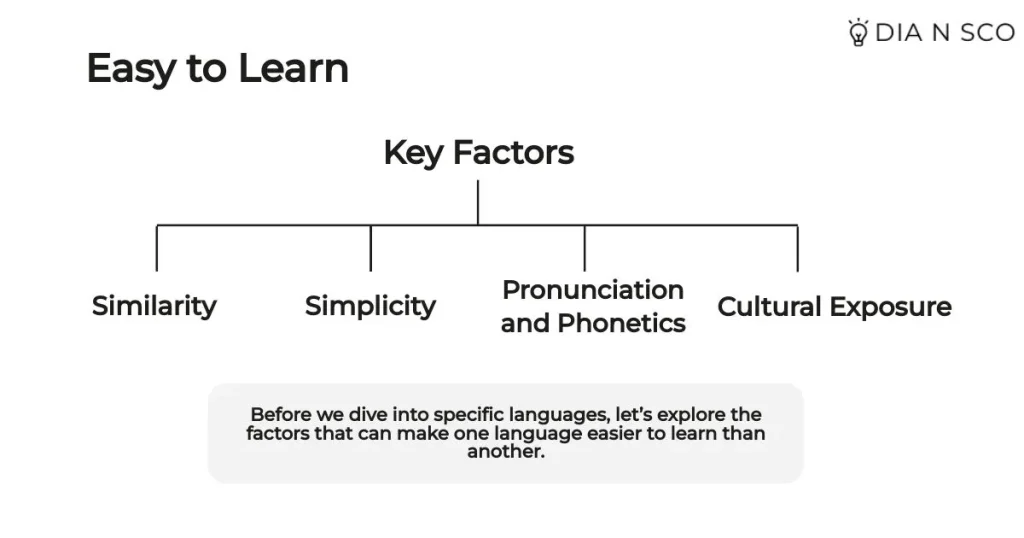When it comes to language learning, especially for English speakers, one common question arises: what is the easiest language to learn for English speakers? Languages can vary greatly in difficulty, but some are notably more accessible due to similarities in vocabulary, grammar, and pronunciation.
Learning a new language can sometimes feel like a daunting task, especially when faced with the vast array of options available. But did you know that some languages are easier to pick up than others for native English speakers? This post will into the most accessible languages, comparing various factors such as grammar, vocabulary, pronunciation, and cultural context. Whether you’re considering a new hobby or planning a trip abroad, this guide will help you find the right to start your learning journey.

The Importance of Choosing the Right Language
Choosing a language that aligns with your interests, goals, and ease of learning can significantly enhance your experience. Whether for travel, work, or personal growth, the right language can open new doors and broaden your understanding of different cultures. By focusing on what is the easiest language for English speakers, you can maximize your learning potential and enjoy the process.
Factors That Make a Language Easy to Learn
Before we dive into specific languages, let’s explore the factors that can make one language easier to learn than another.
Similarity to English
One of the most significant aspects is the linguistic similarity. Languages that share vocabulary, phrases, or roots with English can often be easier for English speakers to comprehend and use.
Simplicity of Grammar
Languages with straightforward grammatical structures can lower the barrier to entry. Complex conjugation rules, gendered nouns, and intricate tenses can make learning more challenging.
Pronunciation and Phonetics
The closer a language’s sounds are to those in English, the easier it is likely to be for English speakers to learn and communicate verbally. If you’ve ever tried to pronounce words in a tonal language, you know how daunting the challenge can be!
Cultural Exposure
Familiarity with a culture or media related to a language can make the learning process much more enjoyable and relatable. Watching films, listening to music, or reading books in that language is an excellent way to immerse yourself.

Top Easy Languages for English Speakers
Now let’s explore some of the easiest languages for English speakers to learn, according to the Foreign Service Institute (FSI).
Spanish
One of the most popular languages in the world, Spanish is not only widely spoken but also relatively simple for English speakers.
Why Learn Spanish?
- Vocabulary Similarity: About 30% of English vocabulary is derived from Latin, which is the root of Spanish. This means you’ll find many cognates (words that look and sound similar).
- Pronunciation: Spanish pronunciation is straightforward and phonetic. Once you learn the basic sounds, you can correctly pronounce most words.
“Spanish is the second most spoken language in the world. Imagine the doors it can open!”
French
Another popular choice, French, is often called the language of love. Its aesthetic appeal and cultural richness attract many learners.
What Makes French Easy?
- Cognates: Similar to Spanish, French shares a vast amount of vocabulary with English due to historical ties.
- Global Exposure: French culture has penetrated a lot of media formats, making it easier to find resources for learning, from films to music.
Italian
Italian is not just the language of delicious cuisine; it’s also one of the easiest languages to learn.
Key Features of Italian:
- Phonetic Nature: Like Spanish, Italian is largely phonetic. What you see in writing is usually what you say.
- Simple Grammar: Italian has less complex conjugation rules than some other languages, which can make the initial stages of learning more enjoyable.
Dutch
Often overlooked, Dutch can be a surprisingly easy option for English speakers.
Benefits of Learning Dutch:
- Linguistic Similarity: Dutch is a Germanic language, just like English, which means they share a lot of vocabulary and grammatical structure.
- Cultural Connections: If you’re interested in the Netherlands or Belgium, learning Dutch might be particularly enriching.
Norwegian
Adding Norwegian to your list might be a bit unique, but it’s an excellent choice for English speakers.
Why Norwegian is Easy:
- Grammar Simplicity: Norwegian has a straightforward grammar system, with fewer exceptions than other languages.
- Pronunciation: Its pronunciation is similar to English, making it easier to learn how to communicate.

Tips for Learning a New Language
Now that we’ve discussed the easier languages for English speakers, here are some useful tips to enhance your language learning:
- Set clear goals: Aim for achievable milestones to keep you motivated.
- Practice daily: Even short, daily practice sessions can be more beneficial than longer, less frequent ones.
- Use language apps: Consider using apps like Duolingo or Babbel for interactive learning.
- Engage with native speakers: Join local language exchange groups or platform-based exchanges to practice conversation.
- Immerse yourself: Watch movies, read books, or listen to music in your target language to develop your understanding and fluency.
Conclusion
Choosing a language to learn can feel overwhelming, but understanding which ones are easier for English speakers can simplify the process significantly. Languages like Spanish, French, Italian, Dutch, and Norwegian present excellent options based on their similarities to English.
By applying these tips and choosing a language that aligns with your interests, you’ll be well on your way to mastering a new language in no time. So grab a textbook, download an app, or sign up for a local class. The world is waiting for your voice!


